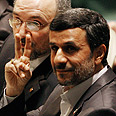
Get serious with Iran
Op-ed: Tepid White House response to Iranian plot will reassure Iran that US is a paper tiger
Yet for some reason, since the White House made the plot public on October 11, there has been a bizarre aversion among many in Washington to identify the leaders of the regime as the culprits. Attorney General Eric Holder suggested that “factions of the Iranian government” had directed the plot while Senate Intelligence Committee Chairman Dianne Feinstein said in a statement “we must learn how high in the Iranian government this alleged conspiracy reaches.”
President Obama finally added his voice in a news conference with the South Korean leader saying, “There are individuals in the Iranian government who were aware of this plot.”
The thinking in academic and journalist circles followed that the regime itself could not be so rogue; perhaps it was merely rogue elements within the regime. Or even more apologetic, some analysts have posited that this simple but botched scheme was not carried out by Iranian intelligence professionals so it couldn’t have been ordered by the Iranian leadership - it might even be a setup of Iran’s Supreme Leader Ayatollah Ali Khamenei in order to spoil the waters for diplomatic engagement.
The truth is that this is a dangerous form of wishful thinking. The White House’s tepid response to the Iranian plot will no doubt reassure the regime that America is a paper tiger.
It should not be hard to understand that the Iranian regime was behind this failed plot. According to the Iran Human Rights Documentation Center, since 1979 top Islamic Republic leaders have been linked to at least 162 extrajudicial killings of political opponents in 19 different countries around the world.
State-sponsored killings
Iran’s global assassination campaign was predicated on the simple principle that opponents of the regime should not be able to find a safe haven anywhere in the world. Thus began a coordinated and extended policy of state-sponsored assassinations abroad, beginning with the Shah’s nephew who was assassinated in Paris on December 7, 1979. Closer to home, Ali Akbar Tabatabai, Iran’s former press attaché in Washington, DC, was shot dead in his home in Bethesda, Maryland on July 22, 1980.
Perhaps the most similar plot to that recently planned in Washington was the Mykonos Massacre in Berlin in 1992. Roya Hakakian describes that incident at length in her new book, “Assassins of the Turquoise Palace.” Two men burst into a private dinner at Mykonos, a Berlin restaurant, and fired a barrage of 26 bullets at eight of Iran’s leading opposition figures. Of the eight targeted that night, four were killed, including Sadegh Sharafkandi, Iran’s most prominent Kurdish leader.
One of the assassins was Abdulrahman Bani-Hashemi, an Iranian hit-man who flew to Turkey and then escaped back to Iran. Previously, he had assassinated an Iranian exile in Switzerland in 1989. He was arrested but held only briefly by Swedish authorities after attempting to kill the Saudi ambassador there.
After the Mykonos murders, German authorities arrested only one Iranian in what Hakakian described as “a ring of small-time Lebanese crooks with histories of petty theft, forgery and other such violations.” Iran’s Minister of Intelligence Ali Fallahian tried to persuade the German authorities to bury the legal proceedings in the case but to no avail. During the four-year trial an Iranian intelligence official defected and testified that Tehran had a list of 500 “enemies of Islam” who were targeted for death.
As in many past cases of Iranian state-sponsored terrorism, the plots can be simple and carried out by local or foreign sympathizers of the Iranian Revolution, but most are coordinated by the Qods Force, a specialized unit of elite members of the Iranian Revolutionary Guard Corps (IRGC) and an integral part of the Iranian regime.
This is Iran without nukes
According to the US State Department’s 2010 Country Report on Terrorism, the Qods Force is “the external operations branch of the Islamic Revolutionary Guard Corps (IRGC),” and “the regime’s primary mechanism for cultivating and supporting terrorists abroad.” It is the main partner used by the Ministry of Intelligence and since its creation in 1980 it has been extensively involved in Lebanon, Afghanistan, Iraq, Bosnia and Sudan.
More recently, it has been active with Hezbollah in South America. Among the more well-known plots it has been involved in are on the two terror attacks in Buenos Aries - the first against the Israeli embassy in 1992 and the second against a Jewish cultural center in 1994.
The handpicked members of the Qods Force are chosen from the already elite ideological army of the IRGC and they pledge their allegiance to - and only answer to - the Supreme Leader of Iran, Ayatollah Khamenei. The oath that each member takes is to uphold the religious dogma of the regime, which is to say it is more than a pledge of loyalty. This is not merely a rogue group of terrorists; it is Iran’s elite ideological and operational Special Forces unit. It does not operate without the consent of the Supreme Leader.
The assassination plot in Washington bears all the hallmarks of the Qods Force and it is dangerous to think otherwise. This escalation on US soil should give all Americans pause. Today, America faces a brazen enemy in Tehran that does not fear US military retaliation. And this is Iran without a nuclear deterrent.
Team Obama’s response has been to demand more sanctions. Such a toothless retaliation to an Iranian operation designed to massacre diplomats and Americans in the US capital makes crystal clear to the Iranians that the White House is not serious about bringing their nuclear weapons program to heel. It is long past time that the White House got serious with Iran.
Matthew RJ Brodsky is the director of policy at the Jewish Policy Center in Washington, DC, and the editor of inFOCUS Quarterly. His website is www.matthewrjbrodsky.com
- Follow Ynetnews on Facebook










